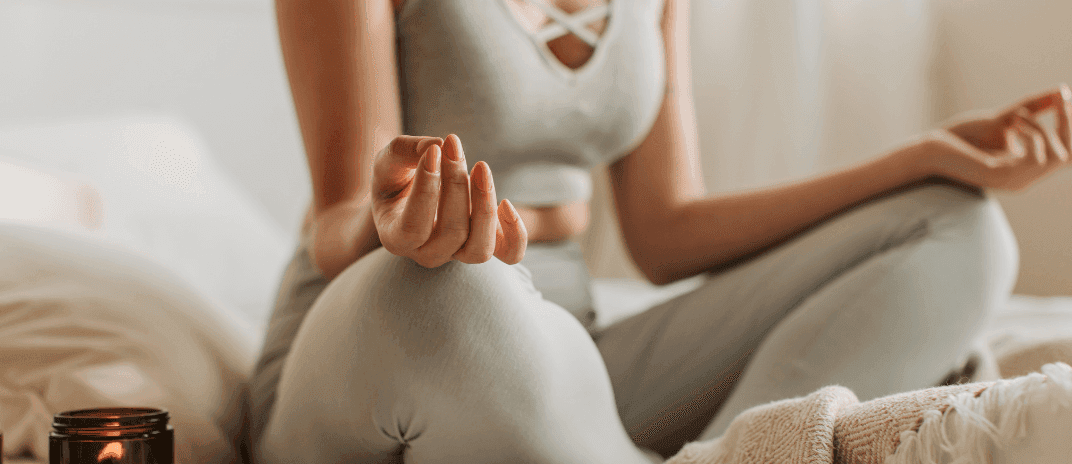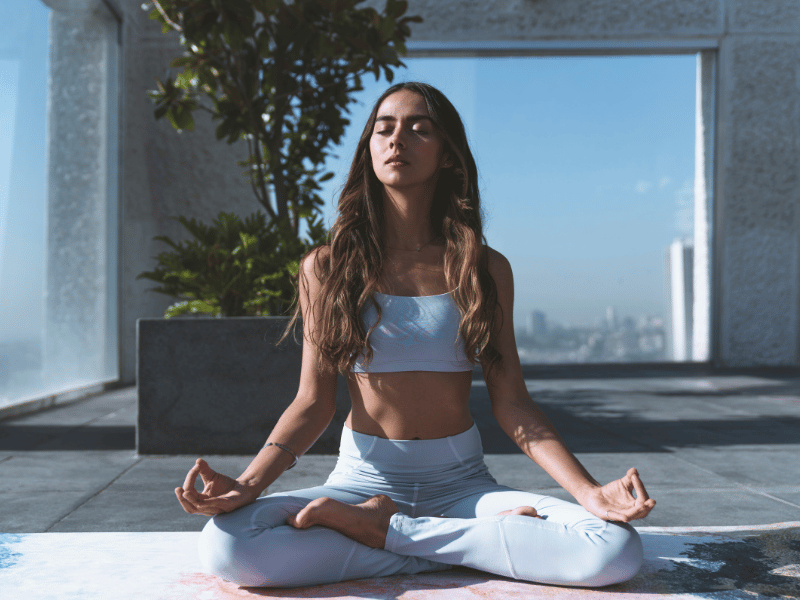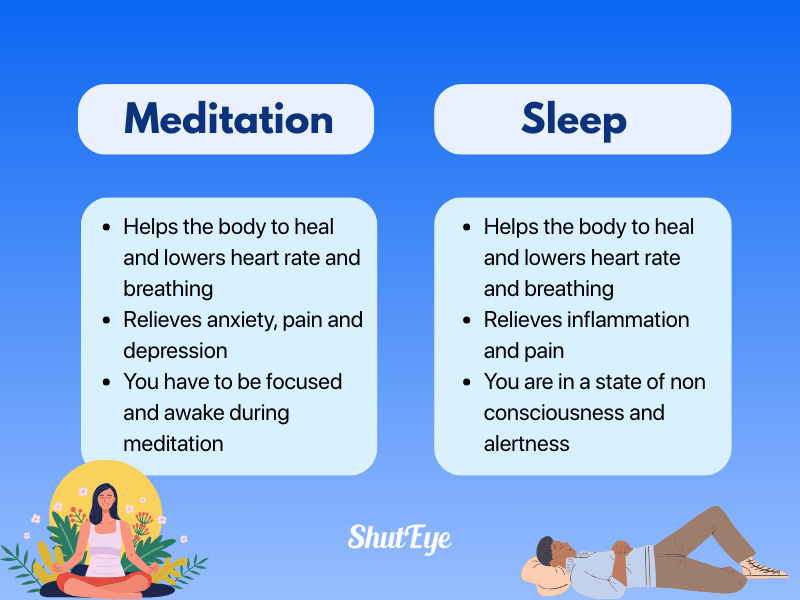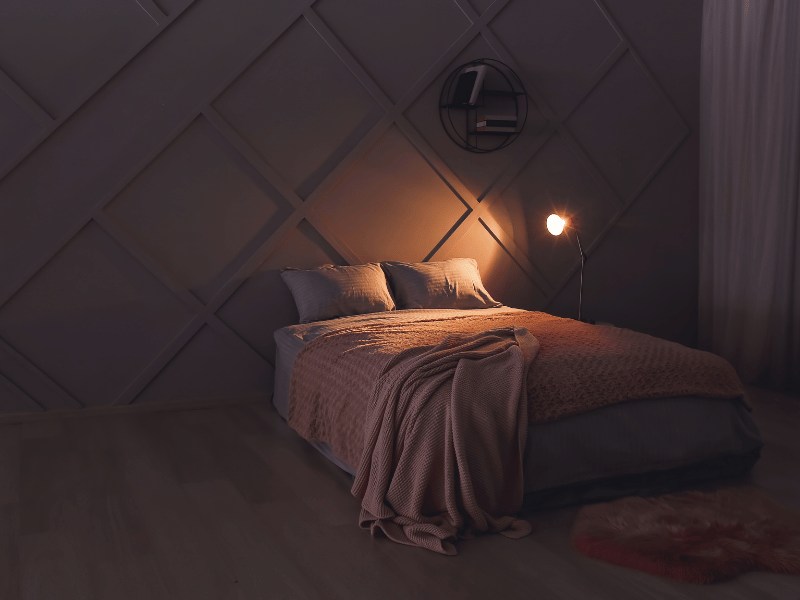


Pulling an all-nighter to finish up on work a common scenario for you? Having a constantly busy schedule and an endless to-do list may have you looking for different ways, like meditation, to make up for lost sleep. But, can meditation replace sleep?
While meditation offers a ton of benefits for the body and mind, you may want to avoid using it as a substitute for sleep. Let’s break down what meditation is and why sleep is still essential.

Meditation is a practice that focuses on emptying your mind and centering yourself so that you can relax and reduce anxiety and stress. There are many different ways of meditation that people may choose to practice, including mindfulness meditation, mantra meditation, using visual imagery, and more.

It is believed that meditation and sleep share some similarities in terms of helping the body to heal and to lower heart rate and breathing [1]. According to a research review published in JAMA Internal Medicine, it is found that meditation can help in relieving anxiety, pain, and depression.
It also helps with lowering blood pressure, breathing, and heart rates during stressful situations [2].
Similarly, good-quality sleep reduces inflammation and improves pain response. Deep sleep reduces brain activity and lowers heart rate and blood pressure as the brainwaves become synchronized [3], [4], [5].
On the other hand, meditation is different from sleep in that you are usually awake and alert during meditation. Your mind should be focusing on an object, breathing or goals. During sleep, you are in a state of non-awareness [6].
The answer is no. While meditation may help with stress and anxiety, which may sometimes be the reason for poor sleep quality, it cannot replace the need for sleep. Sleep is crucial for our overall health and well-being.
Not getting enough sleep leads to sleep deprivation, a condition that severely impacts our cognitive function and daytime functioning. Rather than using meditation to replace sleep, you can combine meditation sessions with good sleep habits.
Meditation may come in many different forms, with the most common ones being [2]:

Regular meditation provides a sense of calm and clarity, which is useful for ensuring good mental health.
It also helps with emotional regulation and improves concentration, leading to reduced stress levels and a better ability to handle daily challenges and responsibilities.
Also, a study that involved novice meditators having to complete 40 minutes of meditation, nap, or controlled activities found that meditation improves attention and alertness. Thus proving its effectiveness [7].
Research suggests that 10 minutes of meditation can have the same benefits as sleeping for 44 minutes [8]. However, that being said, it doesn’t mean that you should swap out a full night’s worth of sleep with meditation.
It’s still important for us to get adequate deep sleep and REM sleep for our body to restore itself and process the information that we learnt from the day.
It’s not entirely clear whether meditation can truly reduce sleep needs as there isn’t enough scientific research to back this up. However, it does appear that meditation can potentially help individuals to function optimally even while they lack sleep, up to a certain point [7].
Sleep is an essential aspect of our lives. It is beneficial in helping us to restore our physical and mental health.
Getting enough sleep can help us to fall sick less often, improve our heart health, reduce the risk of chronic conditions such as type 2 diabetes, high blood pressure as well and improve our cognitive functions so that we can perform our tasks better during the day.
While meditation can help to improve sleep quality, it is only in the short term. We still need sleep in the long term if we want to stay healthy.
Besides practicing meditation, there are also other ways to improve your sleeping patterns. It’s mainly about practicing good sleep hygiene. Here are some other tips:
You may probably think that it’s okay to stay up past your bedtime on the weekends. However, you could potentially be messing up your body clock by doing so.
Instead, you want to stick to a regular sleep schedule, even on the weekends. This will help to regulate your body’s internal clock, also known as circadian rhythm. That way, our brain will be able to recognize when it’s time for us to fall asleep and when it’s time to wake up. That way we can fall asleep faster and wake up more refreshed in the morning.
To find out what the best time to fall asleep and wake up is, try out our FREE sleep calculator!


Creating a comfortable sleep environment is what will help us to fall asleep faster at night as well. A room that is too bright may disrupt our body’s natural production of melatonin, a sleep hormone. When our body produces less melatonin, you’ll find yourself more awake. This is something that you want to avoid at night to prevent sleep disruptions and sleep fragmentation.
A room that’s too warm and noisy can also cause discomfort, leading to less sleep time. It’s important to keep your bedroom environment dark, cool, and quiet. Use an air-conditioner or fan to keep the room at a cool temperature. Consider using blackout curtains and sleep accessories such as a sleep mask or white noise machine.
You also want to create a soothing bedtime routine to help your body and mind relax and wind down for bedtime. This may include doing activities such as taking a warm bath, reading a calming bedtime story, listening to soothing sleep sounds, or doing some light stretches.
The goal here is to reduce any stress or anxiety that we may have during the day so that it doesn’t affect the way we sleep.
You also want to avoid drinking caffeine too late at night. Caffeine is a stimulant that can keep you up for hours or cause you to wake up frequently throughout the night. If you must drink caffeine, ensure that you are consuming it in the morning and early afternoon.
Stop drinking any form of caffeine at least 4 to 6 hours before going to sleep.

Regular exercise can help to improve your sleep quality and sleep duration by reducing stress and enhancing your mood.
Some studies also suggest that those who performed a single session of exercise in the evening managed to fall asleep faster and experienced more deep sleep [8]. However, you should also keep in mind to avoid doing any vigorous activity at least 1 hour before going to sleep. Intense exercises are stimulating, which may delay the time it takes for you to sleep.
Manage your stress by engaging in self-care practices or practicing relaxation techniques. You can do so by journaling, doing deep breathing exercises, or engaging in progressive muscle relaxation.
Such techniques can help to reduce the release of cortisol and adrenaline, which in turn helps you to sleep better at night [9].
While meditation itself has many benefits for your physical and mental health, it should not be used as a replacement for sleep. We still need to get at least 7 hours of sleep each night to fully restore our bodies and ensure that we can function optimally during the day.
If you are looking for a way to get better quality sleep at night, try out the ShutEye® app. It tracks your sleep patterns, analyzes your sleep cycles, and delivers personalized insights to help you rest better. Try it now for FREE!
Anwar, Y. (2019) Stressed to the max? Deep sleep can rewire the anxious brain [online]. Available at: https://news.berkeley.edu/2019/11/04/deep-sleep-can-rewire-the-anxious-brain/
Calhoun, D. A., and Harding, S. M. (2010) Sleep and Hypertension. Chest, 138(2), 434 [online]. Available at: https://doi.org/10.1378/chest.09-2954
Cleveland Clinic (2022) Meditation [online]. Available at: https://my.clevelandclinic.org/health/articles/17906-meditation
Harvard Health Publishing (2014) What meditation can do for your mind, mood, and health [online]. Available at: https://www.health.harvard.edu/staying-healthy/what-meditation-can-do-for-your-mind-mood-and-health-
John Hopkins Medicine (n.d.) Sleepless Nights? Try Stress Relief Techniques [online]. Available at: https://www.hopkinsmedicine.org/health/wellness-and-prevention/sleepless-nights-try-stress-relief-techniques
Kaul, P., Passafiume, J., and Sargent, C. R. (2010) Meditation acutely improves psychomotor vigilance, and may decrease sleep need. Behavioral and Brain Functions: BBF, 6, 47 [online]. Available at: https://doi.org/10.1186/1744-9081-6-47
Klampe, M. (2019) Mindfulness and sleep can reduce exhaustion in entrepreneurs [online]. Available at: https://news.oregonstate.edu/news/mindfulness-and-sleep-can-reduce-exhaustion-entrepreneurs
Muse (2023) The Difference Between Meditation and Sleep [online]. Available at: https://choosemuse.com/blogs/news/difference-between-meditation-and-sleep?srsltid=AfmBOoqFz4BinPuAkM2gamlbM59j9FyzWV_hgJZy4YrloVj_EMmuZzy_
Whale, K. (2022) The Importance of Sleep for People With Chronic Pain: Current Insights and Evidence. JBMR Plus, 6(7), e10658 [online]. Available at: https://doi.org/10.1002/jbm4.10658